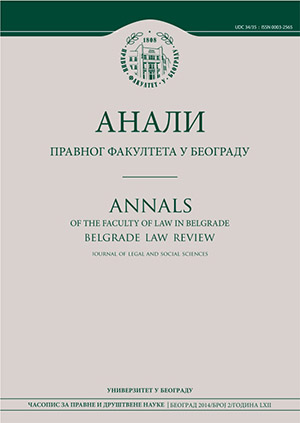СПРОВОЂЕЊЕ АГРАРНЕ РЕФОРМЕ У КРАЉЕВИНИ СРБА, ХРВАТА И СЛОВЕНАЦА НА ПРИМЕРУ ВЕЛИКОГ ПОСЕДА СТРАНОГ ДРЖАВЉАНИНА
AGRARIAN REFORM IN THE KINGDOM OF SERBS, CROATS AND SLOVENES – CASE OF AN ESTATE OWNED BY FOREIGN CITIZEN
Author(s): Gordana DrakićSubject(s): Agriculture, History of Law, Interwar Period (1920 - 1939)
Published by: Правни факултет Универзитета у Београду
Keywords: Agrarian reform; Kingdom of Serbs, Croats and Slovenes; Agrarian Laws; Expropriation of land; Large estates;
Summary/Abstract: The Kingdom of Serbs, Croats and Slovenes, formed after the World War I, was predominantly an agrarian country. One of the most important issues in the state was the implementation of agrarian reform. It was a complex state measure with important social, economic and political impact. The implementation of the agrarian reform in the area of Bačka and Banat (located at the territory of nothern Serbia, called Woiwodina) was partialy influenced by foreign policy relations between the Kingdom of Serbs, Croats and Slovenes with neighbouring countries – Hungary and Romania. A considerable factor of those relationship was a possibility for national minorities to opt for citizenship of one of these states. According to the agrarian laws passed after the commencement of the implementation of agrarian reform (in September 1920) in the Kingdom of Serbs, Croats and Slovenes estates owned by foreign national had to be expropriated regardless of the acreage if the owner had not lived in the Kingdom of Serbs, Croats and Slovenes after the war and the estate was abandoned or let on lease. Therefore, landowners Hungarians protested against the division of their land in the process of agrarian reform in the Kingdom of Serbs, Croats and Slovenes, claiming that it violates the Trianon Treaty.
Journal: Анали Правног факултета у Београду
- Issue Year: 62/2014
- Issue No: 2
- Page Range: 146-163
- Page Count: 18
- Language: Serbian

